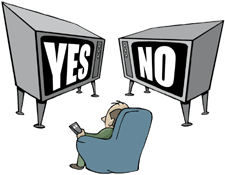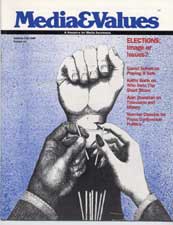FAMILY: Questions to Analyze Political Media
|
Helen Hallum Graham is Vice President of Programs for CEO Executive Forum, Inc. in Atlanta, Georgia, as well as a communications consultant and multimedia producer. She is married and the mother of seven. This article originally appeared in Issue# 44
|
From FDR's fireside chats to glitzy TV documentaries, politicians have been quick to recognize the power of media. Like product ads, today's political spots are designed to engage our inner emotions, using images and symbols to connect with our fears and desires.
The most effective political ads don't create new images, but instead capitalize on moods, beliefs and prejudices already held by listeners and watchers. TV ads, especially, base much of their effectiveness on viewers' habits of believing what they see. These days, the use of the media doesn't end there. As an Atlanta resident, I had a ringside seat in planning for the 1988 Democratic Convention. We've come a long way from the smoke-filled room.
In a colorful extravaganza, its impresarios, Emmy-winning musical variety show producers Smith & Hemion, concocted showmanship designed to hammer home the party's message, woo independent voters and stymie would-be channel changers. A $250,000 satellite feed was set to make sure no local stations missed the action.
How can we adjust to a circus and magic act in the living room? How can the American family separate the American dream of liberty and justice for all from TV illusion? It's not an easy task. But it is possible to establish guidelines for evaluating the strengths and weaknesses of candidates and extracting political goals and ideals from the razzle-dazzle of campaign sleight-of-hand.
"The problem is not that there is too much entertainment but that public discourse and cultural activities are increasingly forced to adopt the guise of entertainment." - Roelf Haan
Start by making a checklist of each candidate's stand on social and ethical issues. How do they relate to the family's– and the nation's– deeper needs? To the  emerging global consciousness? How has television given expression to new ideas and energies? Ask yourself if advertising and television coverage present a different picture than radio or print media. What issues do television or other media ignore? Where can we find better information on political candidates? Stage a home debate to focus on these issues. Family members could each select a candidate, gather information, and defend their choices at a family forum.
emerging global consciousness? How has television given expression to new ideas and energies? Ask yourself if advertising and television coverage present a different picture than radio or print media. What issues do television or other media ignore? Where can we find better information on political candidates? Stage a home debate to focus on these issues. Family members could each select a candidate, gather information, and defend their choices at a family forum.
This kind of discussion provides an outlet for constructive disagreement on candidates and political issues. Conflict always involves risk, but political divergence need not be painful. Families need to realize that they won't always agree. But they can agree to differ– and to make media a healthy part of the process of trying out idea and standing up for one's visions.



